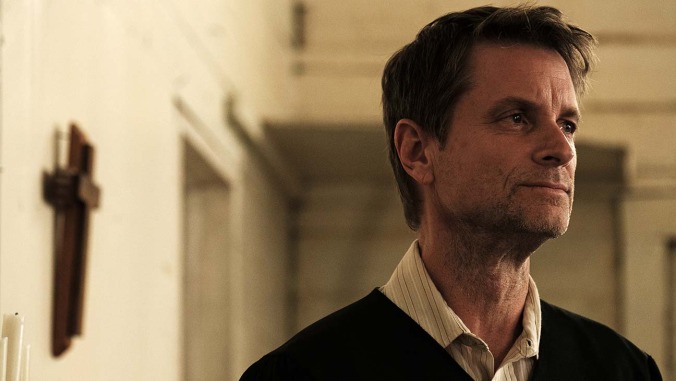Fugitive thriller The Quarry stumbles during its slow trek into no country for old men


Visions of a burning house haunt a nameless fugitive in Scott Teems’ The Quarry. Played by Shea Whigham and referred to only as The Man, the outlaw heads south trailed by police helicopters and a guilty conscience. Desperation begets more desperation, setting the stage for a border-town tale of imposture, sin, and redemption. Yet this muddled slow-burn tragedy—adapted from the Damon Galgut novel of the same name—is unfocused and overly familiar. It also fumbles its political commentary.
After a tussle with alcoholic, traveling preacher David Martin (Bruno Bichir) takes an unexpectedly fatal turn, The Man—already wanted for arson and murder—disposes of the body in a nearby quarry and assumes his victim’s identity as cover. Hand bloodied, he heads into town, where Celia (Catalina Sandino Moreno), a local woman who provides room and board for the town’s visiting holy men, is expecting the preacher—though his late-night arrival and sleepless appearance keep her on edge. That first night, The Man’s suitcase, filled with evidence of foul play, is nabbed by a duo of young malcontents, known troublemaker Valentin (Bobby Soto) and his biddable kid brother. Paradoxically, the drifter turns to the local authorities for help; in charge is Chief Moore, played by Michael Shannon in a dialed-down version of his Nocturnal Animals character.
Reticent and gloomy, The Man draws suspicion from the discerning chief, whose romance with Celia keeps him in conveniently close proximity to the town’s mysterious new preacher. (Sadly, Sandino Moreno is given little to do beyond play off the two Boardwalk Empire alumni). The film suggests that our protagonist is held up to additional scrutiny because he’s white—the first white priest, in fact, to come around these forsaken parts, populated mostly by poor Latinos. Yet The Man’s impassioned sermons, which emphasize God’s forgiveness of sin, strike a chord with the town’s Spanish-speaking congregation. Just as The Man cracks his first smile and finds himself settling into the community, Martin’s body is found.
The Quarry is far from the first movie about a criminal posing as a man of God, as pitting those opposite identities against one another promises an enticing subversion of expectations. We got a variation on the premise just a few weeks ago, in fact, with Corpus Christi, one of this year’s Oscar nominees for Best International Feature. But whereas that film’s moving central performance excused some of its more rote qualities, The Quarry never quite develops into the character study it teases at the start. Whigham anchors The Man with his hauntingly austere and mostly wordless performance, heightening the air of secrecy enveloping his character. It’s a decent showcase for the actor’s talents, but the world around The Man—filled with similarly humorless deadbeats and faceless, ardently religious Latino caricatures—undermines a deeper emotional portrait. The tried and true setup falls into cliché, as it easily can.
As the film ramps up to an inevitable fallout, its focus gravitates toward Chief Moore, growing ever closer to cracking the case. Shannon’s cop is the punchiest and most memorable character on screen, often dropping zingers (“That’s a weird fuckin’ verse”) into otherwise blandly serious conversations. Yet save for a particularly charged discussion in which Moore balks at The Man’s belief that “we are all minorities,” the tension between the two men fizzles before reaching a crest. In other words, The Quarry, glacially paced even at just 100 minutes, doesn’t really work as a convincing game of cat-and-mouse either.
There’s a clear effort to situate the story in the realities of race-based discrimination, particularly that experienced by vulnerable Latino immigrants near the border. When Valentin is accused of The Man’s crimes, white guilt is added to the latter’s repertoire of regret. But this aspect emerges too late and too diffusely. A scattered screenplay with more regard for atmosphere than building out its many moving parts prevents any truly thoughtful statement about the double standards faced by immigrants. It’s clear that Teems envisioned a No Country For Old Men–style thriller updated with present-day political resonance. But The Quarry falls short of that ideal.